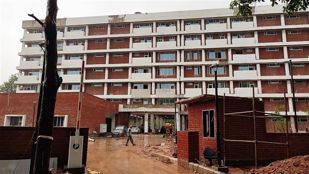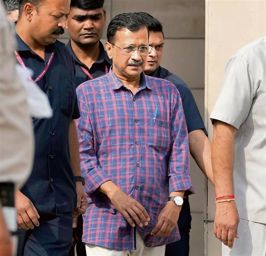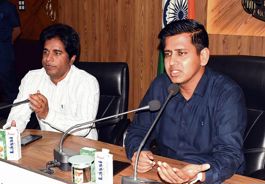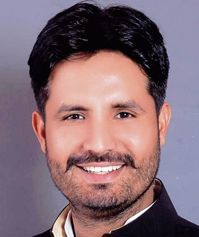
The judiciary needs to do justice to itself by rebuilding its credibility as a mechanism that delivers.
In a judicial setup where decades of delay in decision-making process is a recognised and an accepted norm and expeditious disposal of matters merely an exception, the predicament of the judiciary and the judges travels beyond the need to eventually provide solace to the biggest stakeholder -- the litigant. At stake is the trustworthiness of the justice delivery system.
A system, any system, needs to function like a well-oiled machine to produce results that project its efficiency. Mere promises of performance in the absence of effective functioning, and claims of introducing new components for enhancing its operative competence, will momentarily take away the attention of the people from impending crisis stemming from slow-motion syndrome afflicting the justice delivery arrangement. It will not build up reliability.
Doubts are built upon certainties of inaction, while credibility comes from years of performance. Pendency of 4,72,684 cases before the Punjab and Haryana High Court alone, under the circumstances, can hardly do any good to the institution's image, predominantly when 3,42,952 cases have been pending for more than a year. National Judicial Data Grid figures reveal that 2,986 cases have been pending for more than two decades and 143 cases falling under the category of criminal matters involving constructional right to life and liberty have been pending for 20 to 30 years.
But the problem of plenty manifests itself not just in frightening figures. It exhibits itself in the dilemma of the litigants; people who hang around the courts for their cases to be listed after decades of adjournments, for the matters to be heard, to be decided, to be consigned to the record rooms, to attain finality; cases that were filed by their father, their grandfathers and their great grandfathers; matters that remain merely numbers printed in the cause list of cases released by the high court; cases that shift from one Bench to another after every few months but remain pending, remain undecided and, perhaps, turn infructuous because relief they were seeking has lost its meaning.
Little solace can men derive from the adjudication of matters that were not decided at a time when the relief they had prayed for in their petitions, and before the lords, would have been meaningful and brought about a change in their lives when it was needed the most.
The problem also reveals itself in reluctance of the people to step into the shoes of a litigant even when matters have shades of criminality attached to it, knowing well that they will be walking from one court to another waiting for the verdict. More often than not cases dubbed as "good" and "strong" fail to find their way to the courts as apprehensions stop the people in their tracks. For an accused out on bail, it is nothing less than a win-win situation before the verdict. Living with the presumption of innocence, it is well within his knowledge and belief that time changes many things. "There is nothing that time will not cure. Yes, time and patience", as Irish novelist Liam O'Flaherty said. Time has the unending capacity to heal the wounds of the complainants to some extent and wash away the memory of the witnesses.
To expect that the problem of pendency can be put to an end through wishful thinking and incorporation of a few components in the system is like indulging in a wild goose chase, where the goose refuses to budge.
Former Chief Justice of the Allahabad High Court, Justice SS Sodhi, recently wrote in an article on reliability and answerability that the judicial system was, indeed, accountable to the public and the credibility of the justice delivery system in any civilised society was measured by how expeditious it was, its cost-effectiveness and most importantly its independence.
Chief Justice Sodhi also quoted the case of a DIG whose body was found in Sukhna Lake, Chandigarh, in 1983, to call attention to what long delays can mean in criminal cases. The DIG's wife, son and nephew were sentenced to two years' imprisonment in March 1996 and the court took 21 years to acquit the accused, while holding that 'the appellants were unnecessarily prosecuted', tormented and had to suffer excruciating pain and ordeal for several years.
The least the courts can do to rebuild credibility is to pull from under the dust of time buried files of cases revolving around incidents that are hard to forget; cases such as the DIG's death matter.
The instances are not few in number. In Gurugram, the wife and son of a judge were shot almost a year ago. In Panchkula, a 45-year-old man out to exercise on his bicycle died in a road accident three years ago. Cases like these are required to be put on the fast lane to justice to prevent complainants from going into despair in some cases and help accused redeem their honour in others; and also for instilling a sense of confidence among the people. The judiciary is well advised to identify such cases in each district before taking them up out of turn on day-to-day basis.
In the high courts, the judges need to decide legacy cases in order of institution after following the "first to be filed, first to be decided" system. A monthly cause list of a hundred old and regular cases could be drawn. In case 20 matters are disposed of in the first week, 20 more could be added to the list again in order of institution.
In case some new and urgent matters are left unheard due to paucity of time, they need to be carried forward in the next day's list instead of being adjourned for hearing on a later date. The minute steps may end up playing a big role in image building exercise by giving the litigants the impression that a system of hearing matters is in place and there is no favoritism in the manner of listing cases.
Law and Order
New chapter in service law
Having a dispute with the management of an educational institution in Punjab? Approach the Educational Tribunal and not the high court. Putting an end to the issue of jurisdiction, the Punjab and Haryana High Court has opened a new chapter in service law by ruling that all disputes, except cases involving gratuity under the Payment of Gratuity Act, are to be pleaded before the Tribunal. The question before the high court was whether the Tribunal's jurisdiction could be evoked only in the case of dismissal, removal or reduction in rank imposed as punishment; and whether its jurisdiction was barred, where employees were seeking payment of retirement and similar benefits. The high court ruled the acceptance of arguments that the employees would approach Tribunal only in case of dismissal, etc, would lead to an anomalous situation.



























